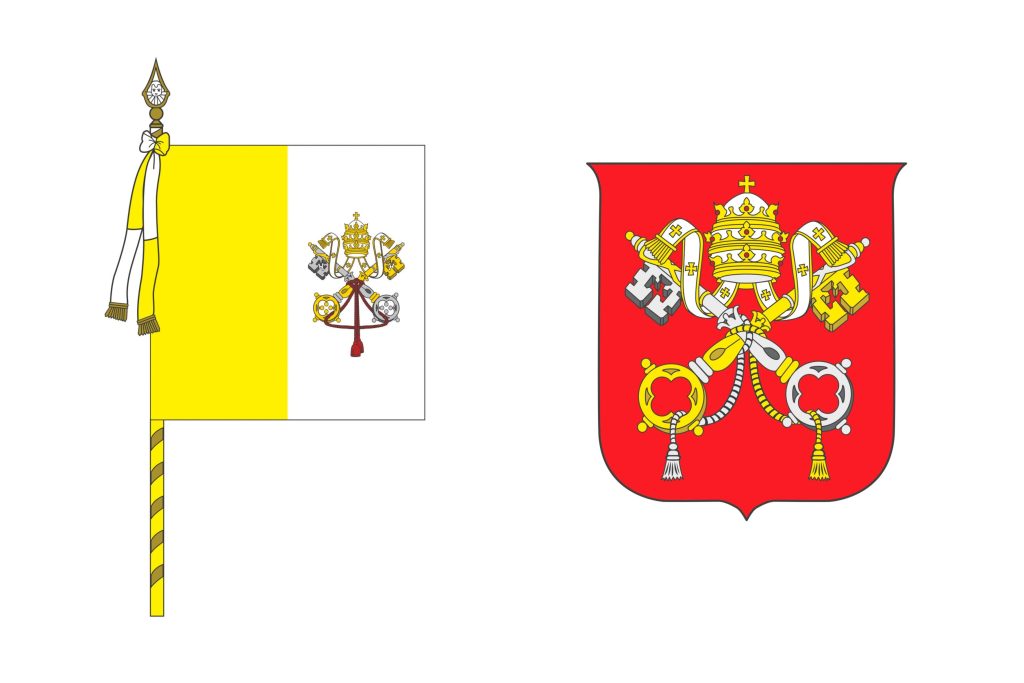May 16, 2023 // National
Pope Issues New ‘Fundamental Law’ for Vatican City State
VATICAN CITY (CNS) — Pope Francis updated the “Fundamental Law of Vatican City State,” opening the possibility that laypeople can be members of its governing commission and emphasizing that the independence of the city-state is essential for the mission of the Holy See.
The previous version of the law was promulgated by St. John Paul II in 2000; his introduction to the text noted the independence of Vatican City State guaranteed “the freedom of the Apostolic See” and assured “the real and visible independence of the Roman Pontiff in the exercise of his mission in the world.”
Pope Francis’ revision of the law incorporates the mission into the text of the law itself.

The flag and crest of Vatican City State are described in the “fundamental law” of the tiny independent nation. Pope Francis issued a new version of the law, which was published by the Vatican May 13, 2023. (CNS photo/Courtesy of Vatican City State)
The first article states, “The Vatican City State ensures the absolute and visible independence of the Holy See for the fulfillment of its high mission in the world and guarantees its unquestionable sovereignty in the international arena as well.”
While the 2000 version of the law entrusted the legislative powers for governing Vatican City State to “a commission composed by a cardinal-president and other cardinals” nominated by the pope for a five-year term, the new law says the commission “is composed of cardinals, among whom is the president, and by other members” nominated by the pope for a five-year term.
The fundamental law also includes a description and drawings of the Vatican flag, crest, and seal — all of which remain unchanged. Unlike the pope’s coat of arms, however, the independent Vatican City State’s symbols feature a tiara, a symbol of temporal rule.
In 2005, Pope Benedict XVI removed the three-tiered tiara from his coat of arms. He replaced it with a miter, a symbol of his episcopal ministry, and Pope Francis maintained that practice. Although St. Paul VI was the last pope to be crowned, it was only in 1996 — with the constitution “Universi Dominici Gregis” on the vacancy of the papacy and the election of a new pope — that St. John Paul II officially substituted the coronation ceremony with the Mass for the inauguration of the pontificate.
Like St. John Paul’s version of the fundamental law, the new version stipulates: “The Supreme Pontiff, sovereign of Vatican City State, has the fullness of governmental power, which includes legislative, executive, and judicial power.” He does, however, usually delegate that power to the governing commission and the Vatican City State courts.
Like the previous law, the new one also reserves to the pope “the power to grant amnesty, pardon, forgiveness, and to commute punishments.”
Given the financial reforms enacted by Pope Benedict XVI and Pope Francis, the new law includes a changed and expanded section on budgeting and spending.
The commission governing Vatican City State is required to draw up a three-year financial plan, which it submits “directly to the Supreme Pontiff for approval.”
“The budget shall ensure the balance of income and expenditures and shall be inspired by the principles of clarity, transparency, and fairness,” the new law says.
The best news. Delivered to your inbox.
Subscribe to our mailing list today.






